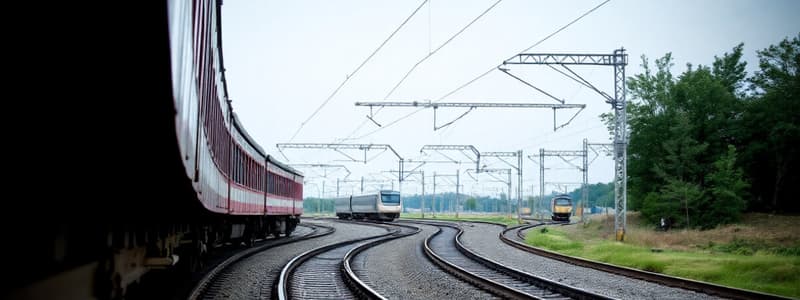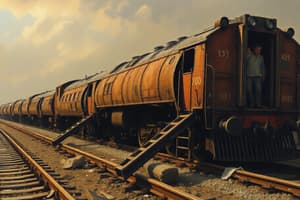Podcast
Questions and Answers
What factor increases the likelihood of derailing on a curve?
What factor increases the likelihood of derailing on a curve?
What occurs when vehicles enter a curve at speeds higher than the maximum permissible speed?
What occurs when vehicles enter a curve at speeds higher than the maximum permissible speed?
Which of the following is NOT an adverse condition that can develop on a curved track?
Which of the following is NOT an adverse condition that can develop on a curved track?
What is the effect of high superelevation on a wagon stopping on a sharp curve?
What is the effect of high superelevation on a wagon stopping on a sharp curve?
Signup and view all the answers
What provides a guiding force for the outer leading wheel during movement on a curve?
What provides a guiding force for the outer leading wheel during movement on a curve?
Signup and view all the answers
Which type of rail is likely to suffer from excessive angular wear?
Which type of rail is likely to suffer from excessive angular wear?
Signup and view all the answers
What is the critical limit referred to in the context of the Y/Q ratio for wheels on a curve?
What is the critical limit referred to in the context of the Y/Q ratio for wheels on a curve?
Signup and view all the answers
What primarily causes the centrifugal force acting on a vehicle on a circular curve?
What primarily causes the centrifugal force acting on a vehicle on a circular curve?
Signup and view all the answers
What shape is typically used for transition curves?
What shape is typically used for transition curves?
Signup and view all the answers
Which formula correctly represents one of the maximum desirable lengths of a transition curve?
Which formula correctly represents one of the maximum desirable lengths of a transition curve?
Signup and view all the answers
What is the purpose of measuring versine in railway tracks?
What is the purpose of measuring versine in railway tracks?
Signup and view all the answers
When measuring versine on straight track, which chord length is standard?
When measuring versine on straight track, which chord length is standard?
Signup and view all the answers
How frequently should versine measurements be taken on turn-out and turn-in curves?
How frequently should versine measurements be taken on turn-out and turn-in curves?
Signup and view all the answers
What formula represents the centrifugal force acting on a vehicle on a curve?
What formula represents the centrifugal force acting on a vehicle on a curve?
Signup and view all the answers
What is the purpose of raising the outer rail on curves?
What is the purpose of raising the outer rail on curves?
Signup and view all the answers
How is equilibrium super elevation represented in the formula?
How is equilibrium super elevation represented in the formula?
Signup and view all the answers
What does the term 'Cant' refer to in railway curves?
What does the term 'Cant' refer to in railway curves?
Signup and view all the answers
What is the relationship between degree of curve and radius of curve expressed as?
What is the relationship between degree of curve and radius of curve expressed as?
Signup and view all the answers
What is the maximum value of superelevation typically prescribed?
What is the maximum value of superelevation typically prescribed?
Signup and view all the answers
What is one reason for providing superelevation on railway curves?
What is one reason for providing superelevation on railway curves?
Signup and view all the answers
In the metric system, how is equilibrium super elevation represented?
In the metric system, how is equilibrium super elevation represented?
Signup and view all the answers
What is the gauge used to measure the width of rail head expressed in?
What is the gauge used to measure the width of rail head expressed in?
Signup and view all the answers
What happens when the cant for a curve is inadequate?
What happens when the cant for a curve is inadequate?
Signup and view all the answers
What is the primary purpose of providing cant deficiency in railway tracks?
What is the primary purpose of providing cant deficiency in railway tracks?
Signup and view all the answers
What is the maximum cant deficiency allowed for normal speeds up to 100 KMPH on Indian railway B.G.?
What is the maximum cant deficiency allowed for normal speeds up to 100 KMPH on Indian railway B.G.?
Signup and view all the answers
What happens if there is excessive super-elevation on a track?
What happens if there is excessive super-elevation on a track?
Signup and view all the answers
Which factor is most affected by higher cant deficiency in railway designs?
Which factor is most affected by higher cant deficiency in railway designs?
Signup and view all the answers
What could be a consequence of insufficient super elevation on a curve?
What could be a consequence of insufficient super elevation on a curve?
Signup and view all the answers
What happens to fast-moving trains if the cant provided is lower than necessary?
What happens to fast-moving trains if the cant provided is lower than necessary?
Signup and view all the answers
Why is a compromise necessary in the cant design for railways?
Why is a compromise necessary in the cant design for railways?
Signup and view all the answers
What does a high cant deficiency require from the track infrastructure?
What does a high cant deficiency require from the track infrastructure?
Signup and view all the answers
What is the cant deficiency for high-speed operations on Indian railway B.G.?
What is the cant deficiency for high-speed operations on Indian railway B.G.?
Signup and view all the answers
Which of the following is NOT a consequence of improper cant and super elevation?
Which of the following is NOT a consequence of improper cant and super elevation?
Signup and view all the answers
What is the main purpose of providing transition curves in railway design?
What is the main purpose of providing transition curves in railway design?
Signup and view all the answers
According to the specified permissible limits, which radius supports a maximum equilibrium cant of 160 mm?
According to the specified permissible limits, which radius supports a maximum equilibrium cant of 160 mm?
Signup and view all the answers
What common issue occurs when a vehicle stops on a sharp curve with high cant?
What common issue occurs when a vehicle stops on a sharp curve with high cant?
Signup and view all the answers
What maintenance precaution is NOT mentioned for curves in the content?
What maintenance precaution is NOT mentioned for curves in the content?
Signup and view all the answers
What design principle is emphasized for transition curves?
What design principle is emphasized for transition curves?
Signup and view all the answers
What is the proposed cant for a curve with a radius of 1164 meters?
What is the proposed cant for a curve with a radius of 1164 meters?
Signup and view all the answers
During the transition into a circular curve, which force increases affecting the track alignment?
During the transition into a circular curve, which force increases affecting the track alignment?
Signup and view all the answers
Which degree of curve has the lowest maximum permissible cant according to the data?
Which degree of curve has the lowest maximum permissible cant according to the data?
Signup and view all the answers
What should the cant gradient on transition be to accommodate irregularities?
What should the cant gradient on transition be to accommodate irregularities?
Signup and view all the answers
Which option is necessary for minimizing wear on the gauge face of the rail during maintenance?
Which option is necessary for minimizing wear on the gauge face of the rail during maintenance?
Signup and view all the answers
What is the length of the transition curve dependent upon?
What is the length of the transition curve dependent upon?
Signup and view all the answers
Which formula provides the maximum desirable length of a transition curve based on cant deficiency?
Which formula provides the maximum desirable length of a transition curve based on cant deficiency?
Signup and view all the answers
What is the objective of measuring versine on a curved track?
What is the objective of measuring versine on a curved track?
Signup and view all the answers
Under what condition should the maximum lengths of transition curves be reduced to 2/3 or 1/2 of their standard values?
Under what condition should the maximum lengths of transition curves be reduced to 2/3 or 1/2 of their standard values?
Signup and view all the answers
What technique is used to ensure accurate versine measurement on curves?
What technique is used to ensure accurate versine measurement on curves?
Signup and view all the answers
What is a consequence of excessive angular wear on curved tracks?
What is a consequence of excessive angular wear on curved tracks?
Signup and view all the answers
How does track distortion generally occur in curvy sections?
How does track distortion generally occur in curvy sections?
Signup and view all the answers
Which factor does NOT contribute to the likelihood of a vehicle derailing on a curve?
Which factor does NOT contribute to the likelihood of a vehicle derailing on a curve?
Signup and view all the answers
What is likely to happen to the guiding force acting on the outer leading wheel during curve negotiation?
What is likely to happen to the guiding force acting on the outer leading wheel during curve negotiation?
Signup and view all the answers
What results from a wagon stopping on a sharp curve with high superelevation?
What results from a wagon stopping on a sharp curve with high superelevation?
Signup and view all the answers
What typically happens when gauge widening occurs on a curved track?
What typically happens when gauge widening occurs on a curved track?
Signup and view all the answers
What role does centrifugal force play when a vehicle moves on a circular curve?
What role does centrifugal force play when a vehicle moves on a circular curve?
Signup and view all the answers
Which of the following describes a situation that can lead to wheel mounting during curve navigation?
Which of the following describes a situation that can lead to wheel mounting during curve navigation?
Signup and view all the answers
What is the maximum permissible cant for a curve with a radius of 291 meters?
What is the maximum permissible cant for a curve with a radius of 291 meters?
Signup and view all the answers
Which radius corresponds to a maximum equilibrium speed of 250 mm?
Which radius corresponds to a maximum equilibrium speed of 250 mm?
Signup and view all the answers
What is the recommended practice for the cant gradient on transition curves?
What is the recommended practice for the cant gradient on transition curves?
Signup and view all the answers
Which factor primarily affects lateral flange force when a vehicle enters a curve?
Which factor primarily affects lateral flange force when a vehicle enters a curve?
Signup and view all the answers
When a vehicle stands on a high cant, what issue can happen upon starting movement?
When a vehicle stands on a high cant, what issue can happen upon starting movement?
Signup and view all the answers
What is the maximum equilibrium cant for a curve with a radius of 1746 meters?
What is the maximum equilibrium cant for a curve with a radius of 1746 meters?
Signup and view all the answers
What is the consequence of having a cant gradient that is too steep during maintenance?
What is the consequence of having a cant gradient that is too steep during maintenance?
Signup and view all the answers
To achieve gradual superelevation, which aspect must increase uniformly in a transition curve?
To achieve gradual superelevation, which aspect must increase uniformly in a transition curve?
Signup and view all the answers
What is an important consideration during the design of transition curves?
What is an important consideration during the design of transition curves?
Signup and view all the answers
What is one of the consequences of excessive super-elevation on railway tracks?
What is one of the consequences of excessive super-elevation on railway tracks?
Signup and view all the answers
What is the relationship between cant deficiency and passenger comfort?
What is the relationship between cant deficiency and passenger comfort?
Signup and view all the answers
Which of the following factors is affected by higher cant deficiency in track design?
Which of the following factors is affected by higher cant deficiency in track design?
Signup and view all the answers
Given the limits for cant deficiency, what is the maximum allowable value for high-speed operations on Indian railway B.G.?
Given the limits for cant deficiency, what is the maximum allowable value for high-speed operations on Indian railway B.G.?
Signup and view all the answers
What compromise must be made to accommodate both fast and slow-moving trains on curves?
What compromise must be made to accommodate both fast and slow-moving trains on curves?
Signup and view all the answers
When cant deficiency is high, what is likely to be required from railway infrastructure?
When cant deficiency is high, what is likely to be required from railway infrastructure?
Signup and view all the answers
What risk is associated with inadequate super elevation on railway curves?
What risk is associated with inadequate super elevation on railway curves?
Signup and view all the answers
Which of the following is NOT a consideration when designing cant for railway curves?
Which of the following is NOT a consideration when designing cant for railway curves?
Signup and view all the answers
What is the impact of lower cant on the outer rail during fast train operations?
What is the impact of lower cant on the outer rail during fast train operations?
Signup and view all the answers
What does a compromise in cant design allow for slow-moving trains?
What does a compromise in cant design allow for slow-moving trains?
Signup and view all the answers
What does the term 'equilibrium super elevation' refer to?
What does the term 'equilibrium super elevation' refer to?
Signup and view all the answers
What is the relationship between the degree of the curve and the radius expressed by the equation?
What is the relationship between the degree of the curve and the radius expressed by the equation?
Signup and view all the answers
Which factor influences the design of superelevation on railway curves?
Which factor influences the design of superelevation on railway curves?
Signup and view all the answers
What is the significance of raising the outer rail in railway curves?
What is the significance of raising the outer rail in railway curves?
Signup and view all the answers
What is the maximum recommended cant for curves generally stipulated by railways?
What is the maximum recommended cant for curves generally stipulated by railways?
Signup and view all the answers
How is equilibrium super elevation calculated in the metric system?
How is equilibrium super elevation calculated in the metric system?
Signup and view all the answers
What happens if there is excessive cant on a railway track?
What happens if there is excessive cant on a railway track?
Signup and view all the answers
Which measurement is used to identify the allowable cant deficiency for high-speed rail operations?
Which measurement is used to identify the allowable cant deficiency for high-speed rail operations?
Signup and view all the answers
What is the consequence of providing inadequate cant on curves?
What is the consequence of providing inadequate cant on curves?
Signup and view all the answers
What is the specified gauge when referring to the width of the rail head?
What is the specified gauge when referring to the width of the rail head?
Signup and view all the answers
Study Notes
Chapter 5: Derailment on Curves
- Rolling stock has a higher chance of derailing on curved tracks due to the flange constantly pressing against the outer rail, in addition to normal tread contact.
- Analysis of derailments on the Central Railway shows a higher number on curved alignments compared to straight tracks.
- Proper maintenance of curved tracks is essential.
5.1 Adverse Factors on a Curve
- Curved tracks have a higher chance of developing the following:
- Excessive angular wear on the outer rail
- Excessive flattening of the head on the inner rail
- Fracture and failure of rails
- Gauge widening
- Track distortion
5.1.1 Vehicles Entering a Curve
- Vehicles entering a curve at speeds exceeding the maximum permissible speed can cause track distortion or wheel mounting on the outer rail.
- Wheel mounting on the inner rail can also occur during sudden braking, potentially causing vehicle bunching.
- Gaping holes in ballast, often caused by shifting of sleepers, are another indication of curve problems.
5.1.2 Outer Rails on Curves
- Outer rails on curves experience increased angular wear, creating an inclined plane that can cause wheel slippage.
5.1.3 Wagon Stopping on a Curve
- Wagons stopping on sharp curves with high superelevation can cause the outer wheels to unload.
- When the wagon starts moving even at a slow speed, the guiding force on the outer leading wheel increases significantly.
- The Y/Q ratio for the outer leading wheel increases and mounting on the rail can occur if it exceeds the critical limit.
5.2 Cant or Superelevation
-
When a vehicle moves on a circular curve, centrifugal force acts away from the center.
-
This force is calculated using the formula: F = WV²/GR
- F = centrifugal force (tons)
- W = weight of the vehicle (tons)
- V = speed (feet/sec)
- G = acceleration due to gravity (feet/sec²)
- R = radius of the curve (feet)
-
To counter the centrifugal force, the outer rail on curved tracks is kept slightly elevated above the inner rail.
-
This elevation is called cant or superelevation.
-
A state of equilibrium occurs when both wheels bear equally on the rails.
-
The equilibrium super elevation is given by: - e = GV²/gR (metric) - e = GV²/GR (imperial)
-
where:
- e = equilibrium superelevation
- G = gauge + width of rail head (mm)
- V = velocity
- R = radius of the curve
-
Cant for curves is normally indicated on the inside of the inner rail.
5.2.1 Reasons for Providing Superelevation
- Provides better distribution of load on the rails.
- Reduces wear and tear on rails and rolling stock.
- Neutralizes the effect of lateral forces.
- Provides comfort to passengers.
5.2.2 Degree of Curve V/S Radius of Curve
- The degree of a curve (D) is the angle subtended by the curve at its center by a chord of 30.5 meters.
- The relationship between radius and degree of a curve is given by: D = 1750/R
5.2.3 Effect of Excessive or Inadequate Cant
- Maximum superelevation is approximately 1/10 to 1/12 of the gauge.
- Prescribed values of maximum superelevation for Indian Railways are provided in Table 5.1.
5.3 Cant Deficiency
- Cant deficiency is the difference between equilibrium cant required for maximum permissible speed and the actual cant provided.
- Higher cant deficiency leads to passenger discomfort and requires stronger track and fastenings.
- Normal speeds in Indian railways (B.G.) - 75 mm, high speeds - 100 mm cant deficiency.
5.4 Transition Curve
- Transition curves are provided on either side of circular curves to smoothly transition from straight tracks into circular curves.
- This ensures a gradual increase in curvature and superelevation.
- The shape of the transition curve is usually a cubic parabola.
5.4.1 Length of Transition Curve
-
The length of transition curves depends on the degree of curve, permissible speed, superelevation rate, and the rate of cant runoff.
-
Length is maximum of 3 values:
- 0.008 Ca * Vm
- 0.008 Cd * Vm
- 0.72 Ca.
-
In exceptional cases, length can be up to 2/3 of (1), 2/3 of (2) or 1/2 of (3).
5.5 Versine
- Versine is the perpendicular distance from the chord line to the arc between 2 marked stations.
5.5.1 Objective of Measuring Versine
- To check the degree and radius of curved tracks.
5.5.2 How to Measure Versine
- Versines are measured using 20-meter overlapping chords.
5.5.3 Determining Degree of Curve using Versine
- Versine on a 11.8-meter chord directly gives the curve degree.
- For a 6-meter chord, it's 1/4 of the curve degree.
- 3-meter chord is 1/16 of the curve degree.
Studying That Suits You
Use AI to generate personalized quizzes and flashcards to suit your learning preferences.
Related Documents
Description
This quiz covers Chapter 5 on derailment issues faced on curved tracks in railway engineering. It examines factors contributing to derailments and emphasizes the importance of track maintenance. Get ready to test your knowledge on the challenges of railway safety!




